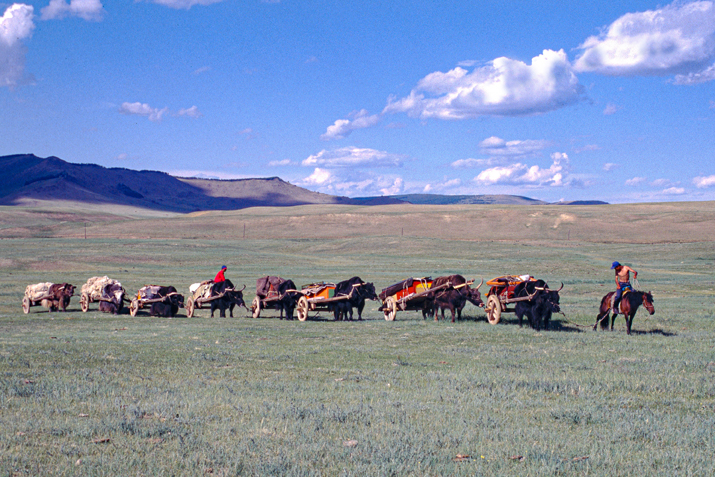
Trapped in the labyrinth of ice lakes
N 51°14'575'' E 099°27'891''
Day: 100
Sunrise:
08:14
Sunset:
17:58
As the crow flies:
17,57
Daily kilometers:
40
Total kilometers:
1106
Soil condition:
Ice, snow
Temperature – Day (maximum):
minus 10°C
Temperature – day (minimum):
minus 15°C
Temperature – Night:
minus 35°
Latitude:
51°14’575”
Longitude:
099°27’891”
Maximum height:
1503 m above sea level
Time of departure:
12:30
Arrival time:
18:10
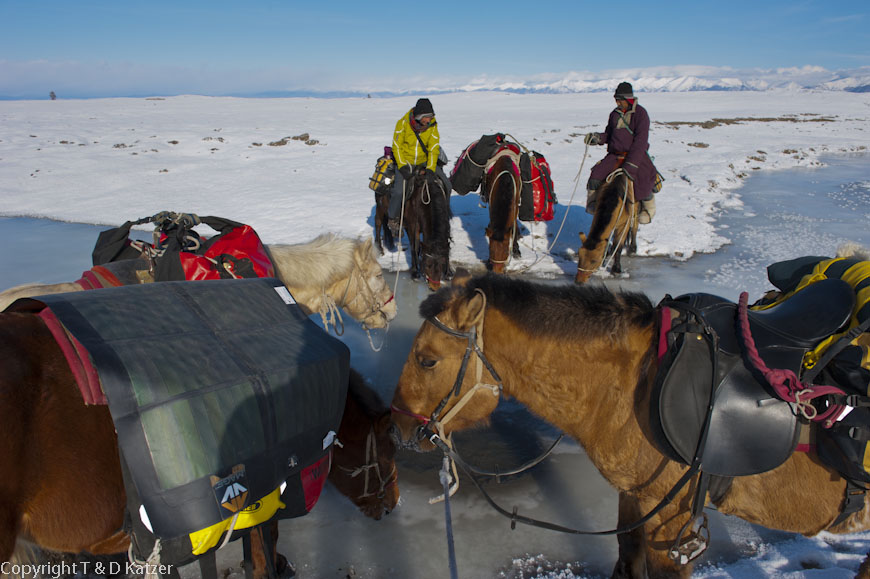
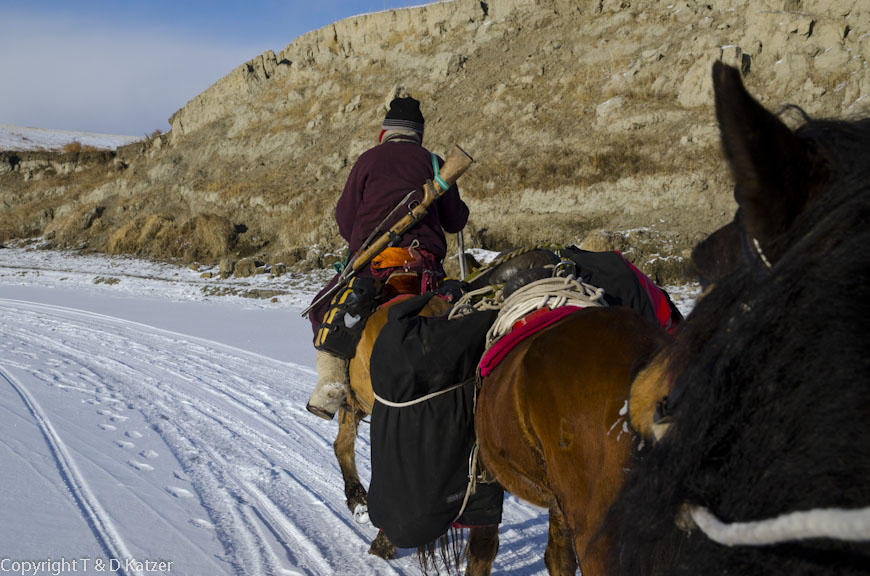

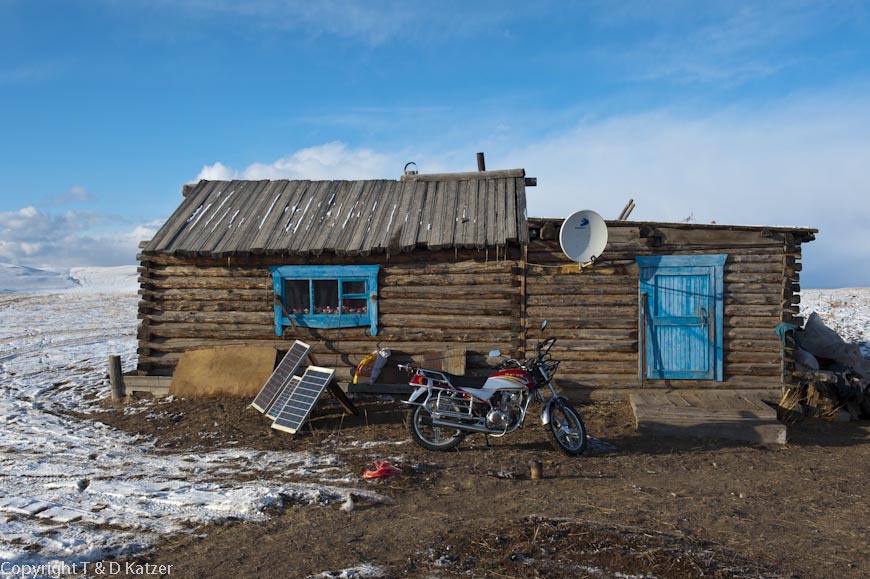


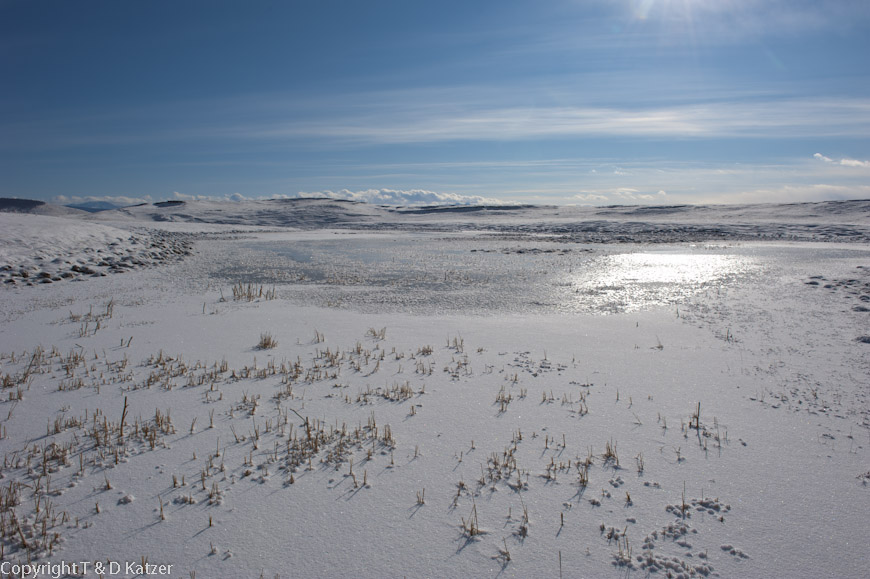
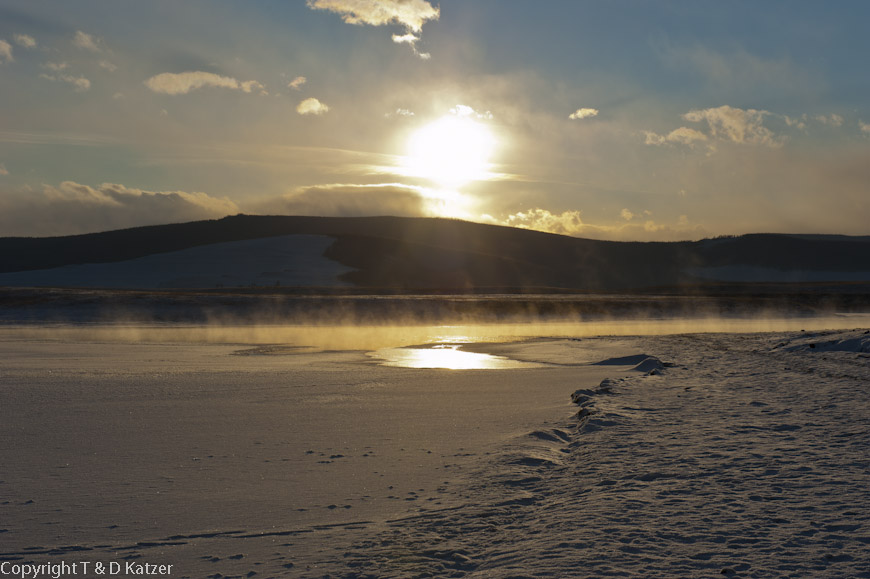
The nose, ears, cheekbones and even the forehead hurt. I open my eyes and feel the bite of the cold. Tanja lies next to me like a mummy. White smoke seeps out of the small opening in the sleeping bag hood. It is their breath that immediately settles as ice crystals on the head area of the down cover and freezes it into hard ice. I slowly rewind yesterday in my mind’s eye. The fall and the ensuing panic enter my consciousness. I move my knee carefully. It works. It hurts but it moves. I can also move my ankle and shoulder with only slight pain. “So, how are you feeling?” come half-smothered words from the downy fabric through the small icy opening. “I’m not sure yet, but I think I’m okay. The knee isn’t swollen. That’s a good sign,” I reply. “Can you ride?” it asks from the small opening in Tanja’s nightcap. “I have to see if I can walk first. Then I’ll know,” I reply with slight confidence.
We crawl out of the tent at only minus 12 °C. I try to tread carefully. It succeeds. “I can certainly ride,” I say to Tanja and Bilgee. Then we pack up our tents. “Daraa bajartaj majhan”, “Goodbye tent”, Bilgee says goodbye to his faithful dwelling of the last few months. We laugh heartily at his dry sense of humor. I also say “Daraa bajartaj majhan” (“Goodbye tent”). Because we covered 40 kilometers yesterday, we can actually expect to reach our stage destination tonight and thus not have to put up our tents for at least six months.
With confidence and anticipation of being able to sleep in a warm yurt tonight, we set off. At first I find it difficult to trot because of my aching knee and ankle, but after a while my body gets used to the movement and the pain just whimpers silently. It doesn’t take long and we have to cross some frozen small rivers again. We venture out onto the ice very carefully. “It carries,” Bilgee is certain and is the first to ride across the ice. Then we follow. A few hundred meters away, Bilgee spots a couple of shepherds driving their yaks across the sea of ice glistening in the sun. Bilgee gallops up to them to ask for directions. As we wait for him, the minus 15 °C quickly chills us. Then Bilgee comes back and shows the way.
We reach one of the many lakes that I had already discovered while studying the map. Because the ice cover is not yet thick enough, we trot along its winding shore until we come across another lake. “We can’t go any further here,” says Bilgee, which is why we are forced to turn back. After about two or three kilometers, we come across another lake. Several vehicle tracks bear witness to a load-bearing ice cover. We descend and cross it carefully. It cracks and crunches suspiciously. Huge stress cracks whip through the large ice surface, almost stopping our hearts in shock. Then the ice sings strangely. “What are those noises?” asks Tanja with wide eyes. “The ice is constantly deforming. It’s stress cracks that cause these sounds,” I reply somewhat nervously. We are glad to reach the other shore in one piece.
Then we come across a lonely, inhabited log cabin. The people explain a supposedly safe route across the lake landscape. We follow their directions only to come across another lake a few kilometers further on that still shows open patches of ice. We turn back again and follow the eternally stretching riverbank. This goes back and forth for hours and in the end we ride back in the direction we came from. “Do you see that mountain over there?” I ask Tanja, pointing to a hill. “Yes.” “On its sloping flank is the cemetery we passed yesterday,” I explain. “Does that mean we’ve been riding in circles all day?” “Exactly. My instinct to not take the shortcut and ride to Renchinlkhumbe was right and would have been much shorter. Now we’re literally trapped in this labyrinth of lakes,” I explain. “Do you think we won’t make it to Tsagaan Nuur today?” “Absolutely not. Look at your watch. We haven’t come a single kilometer closer to our destination since this morning,” I reply a little resignedly.
Shortly before sunset, a large stream steaming in the evening light blocks our way. We follow it to a tributary that flows into a half-frozen lake. Bilgee checks his depth and tries to persuade Tenger to cross the tributary. Tenger whinnies excitedly and refuses to set foot in the ice-cold water. Bilgee gives everything to drive him into it but without any success. Suddenly a rider appears on the other bank. “Try the lake!” he yells over to us. But as the lake is only partially frozen over, Bilgee hesitates. The man on the other side quickly steers his horse to the shore, gets out of the saddle and leads his horse across the loudly cracking ice. We watch spellbound, hoping not to witness a terrible accident. He reaches us laughing and wants to take the lead rope out of Bilgee’s hand to bring him to the other side. Bilgee laughs too, but refuses to give him the rope. “It’s starry hail blue,” says Tanja. “Yes, it is,” I agree with her. “Shall we take the plunge and walk across the ice?” Bilgee asks me. “Let’s call it a day. I saw a tree a few kilometers from here. We should set up camp there and use our new energy to find a safe way out of the dangerous labyrinth tomorrow,” I suggest.
In the meantime, the drunk is mocking us. “It’s no problem to cross the lake! You’ve seen it!” he shouts. After he realizes that we don’t accept his suggestion, he leaves us standing and gallops off.
Bilgee considers my words and says; “Give me a try Denis.” “Okay, but be careful,” I reply. After the drunk is out of sight, he leads Tenger and Od onto the snow-covered ice. Loud cracks of tension shoot under the horses’ hooves, causing the animals to look up nervously. Bilgee slowly moves on. Tenger reluctantly follows meter by meter. If the ice were to break, there wouldn’t be the slightest chance of survival for Bilgee and the animals. Every year, careless and overly courageous or perhaps even drunk Mongolians die when they cross lakes that have not yet frozen over properly in late October or early November in order to take a shortcut. We were warned about this very situation. And now our horseman is groping his way over such a slab of ice with our horses and equipment, just to save 15 or 20 kilometers. “That doesn’t make any sense. It’s nonsense,” I say to Tanja, who is standing next to me on the bank, watching Bilgee’s steps spellbound. Suddenly, another huge stress crack pops over and through the ice, leaving us breathless. Bilgee stops instantly. “Leave it alone!” I shout, but Bilgee tries to walk on. The drunk has shown that it works. Only he had one horse behind him and not two. This is an essential and perhaps vital difference. “Tttzzuuuunng! Tttzzuuuunng!” it cracks like an oversized arrow being shot from an oversized bow. Tenger suddenly stops and doesn’t move another centimeter. “Animals certainly have a strong instinct for such danger,” I say quietly. Bilgee now pulls on Tenger’s lead rope, but Tenger remains frozen in place. “Listen to your instincts,” we were advised before the trip. My gut is screaming danger. Or is it my mind? No matter. Bilgee has to go down there. “Come back Bilgee! Let it go! Even if it works, we won’t follow you!” I shout. Bilgee waves his hand to let us know not to go any further.
Back on the shore in one piece, we trot along the lake for a while. “I can’t do it anymore. My toes are completely numb,” says Tanja, getting off her horse and walking to pump blood back into her feet. I also suffer from numb, painful toes. All 10 toes have united to form a single pain. In the meantime, the thermometer has dropped to minus 20 °C. I am aware that our limbs are at great risk. The only question at the moment is how much damage has already been done? As women generally get cold more easily and more quickly than men, I’m very worried about Tanja. It would be fatal to freeze toes or even lose them. Although it doesn’t matter when you get frostbite. The consequences are always fatal. It’s really strange. We have put together the perfect equipment and the only weak point is the shoes. Of course, the legitimate question is why we didn’t bother to bring extra warm footwear? But as they are rated down to minus 70 °C, we were sure we would never have a problem with this piece of equipment. And honestly, where should something like this be tested in Europe? Such extreme conditions are perhaps only found in the high Alps. If you buy winter equipment, you can perhaps test it in a cold chamber. But that’s a real joke and just a sales argument. Or should you be locked in a chamber like this for a week to experience real conditions? The only way to test winter equipment is on site. Where it is really cold. Just as cold as here. But it’s too late now. We have to try to get out of here without any injuries. Tanja walks briskly in front of me. After about two kilometers we are forced to get back into the saddles because of the approaching night in order to find a place to camp as quickly as possible.
We’ve been trotting back and forth for over six hours now without even a short break and without having eaten anything. Our stomachs call out for food. We are dog-tired and demoralized by the detour.
Only after sunset do we reach the shore of the lake where we were two hours ago. Tanja fetches firewood from a few trees. I’m just setting up the tent when a shepherd appears out of nowhere and has a long, animated conversation with Bilgee. As far as I understand, it’s about the path. Then the two disappear, only to return a little later with firewood. The shepherd’s dwelling must have been hidden from our view behind a slight rise about 200 meters from the shore of the lake.
As soon as the fire is lit, we tear our shoes off our feet in the minus 22°C to warm our stiff toes. The wet, sweaty socks freeze as soon as you step out of your shoes. Over the flames, however, they immediately become mobile and steam. It hurts as our toes slowly thaw and we burn holes in our socks. “Oh, I hope I didn’t freeze to death,” Tanja moans a little. “Don’t think so,” I try to be confident.
Since the cold has made any water transportation impossible for many days and there is no river water or enough snow to melt here, Bilgee goes to the lake to break out ice. Half an hour later, he returns to the camp, dragging a horse blanket full of ice behind him. Tanja puts small blocks of ice in a pot and puts it on the fire. Without any protection from the wind, we huddle around the small, hot, reddish-yellow flickering flames and try to store their warmth in our bodies. Our toes are showing signs of life again, so we slip into our cold winter boots to walk around the camp. We put everything in the awning that shouldn’t stay outside and slip into the fabric houses, which are now freezing cold at minus 25°C.
The thermometer shows minus 28 °C when I have to stop working on my laptop. No chance of typing my notes in these temperatures without endangering myself or the technology. We retreat into our sleeping bags, close any openings and try to breathe warmly. “Can you hear the lake singing?” I ask Tanja. “Almost a little scary,” she replies. “Yes, it sounds like whales are talking to each other using sonar,” I reply, listening to the sounds I’ve never heard before in my life. “How are your toes?” I ask. “That’s all right. They’re cold,” Tanja replies tiredly. Despite the hot water bottle, my feet stay cold too. No wonder. When I struggle outside at night to take a quick dip, the mercury has dropped to minus 35°C.
“Minus 35 °C and we’re sleeping on icy ground and open terrain right next to an ice lake plagued by stress cracks. I’ll be glad when we’ve left this labyrinth of lakes and rivers behind us in one piece,” I murmur, slipping into the tent after a quick glance at the freezing horses.
We look forward to your comments!

